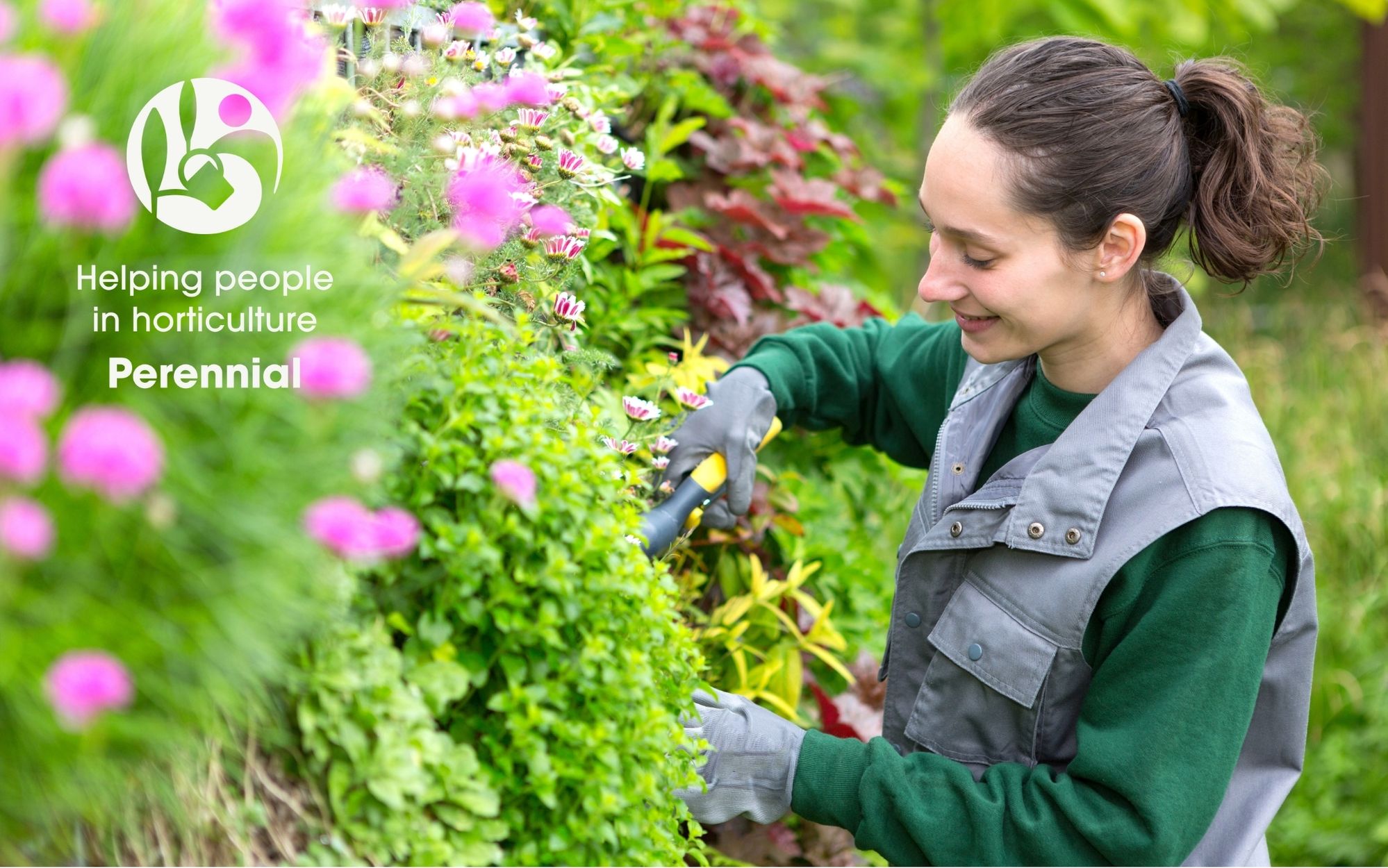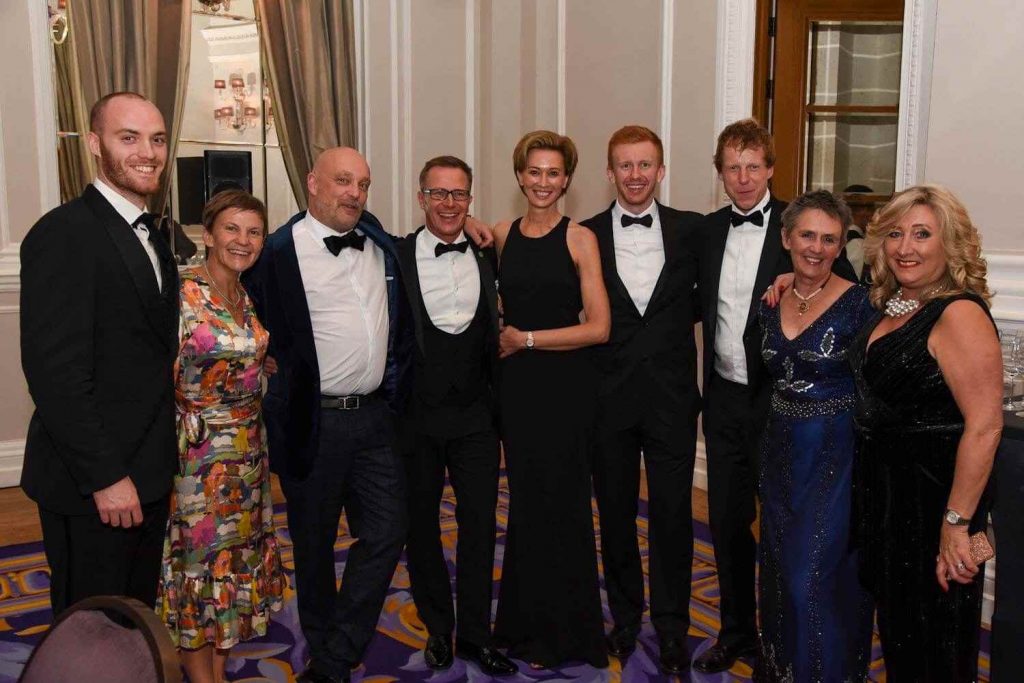In the second of the series of Perennials guest blogs we take a brief look at the history of Perennial as well as what we are doing now to support the industry.
Perennial’s mission is that everyone who works with plants (including landscapers) knows about Perennial and the services we provide and that they feel confident to get in touch with us, should they need our support. So, it is a fabulous opportunity to have a regular blog with supporters like London Stone to help us spread the word.
When we were initially invited, I sat down (yes, after over a year of virtual meetings, we actually met up and sat, safely socially distanced of course) with Beth, London Stone’s Copywriter & Content Creator to discuss various subjects that would be of potential interest to the readership.
The only slight “difficulty” I have in my role, and it really is a double-edged sword, is that we don’t have an elevator pitch as such. Perennial support those who work in the industry (and their dependent families) in so many diverse ways, sometimes it is difficult to succinctly sum them up in a line (or indeed a blog). Given the opportunity, I could talk about Perennial all day. That said, we have come up with a plan (albeit a moveable feast) and thought it would be sensible to start from the beginning and discuss Perennial’s roots.
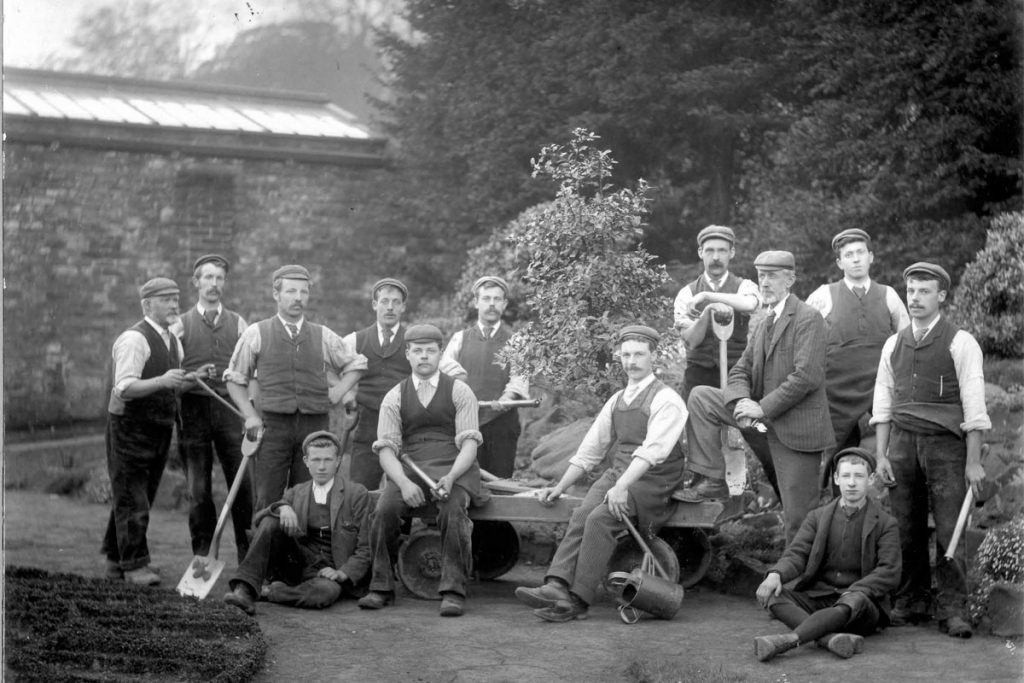
The Gardeners’ Benevolent Institution has a rich history extending back to 1839.
The History of Perennial
I adore the fact that, like so many brilliant ideas, The Gardeners’ Benevolent Institution (now Perennial) was founded in a pub! On 17 January 1839 at an annual dinner for Nurserymen, Florists and Amateurs, in between two cholera epidemics, the good gentlemen of the day aimed to provide a source of income for gardeners in retirement, recognising that those who had been low-paid workers all their lives on estates and in public gardens had no means of looking after themselves in their later years and often lost their tied accommodation on retirement. Sadly, almost 200 years later, homelessness is still something that we provide support with.
By the mid-1840s, The Gardeners’ Benevolent Institution was already having a major impact and an annual fundraising dinner was established, to which ‘celebrities’ of the day were invited, to encourage donations and rally support from landed gentry and royalty, who employed large numbers of gardeners. Robert Peel and Charles Dickens were among the keynote speakers of the period, the latter famously saying in his opening address of 1852.
“…His gains are not great and knows gold and silver more as being the colours of fruit and flowers than by their presence in his pockets. He is subjected to that kind of labour which renders him peculiarly liable to infirmity and when old age comes upon him, the gardener is, of all men perhaps, best able to appreciate the benefits of the Institution…”
A statement, I think, that still resonates with our industry today.
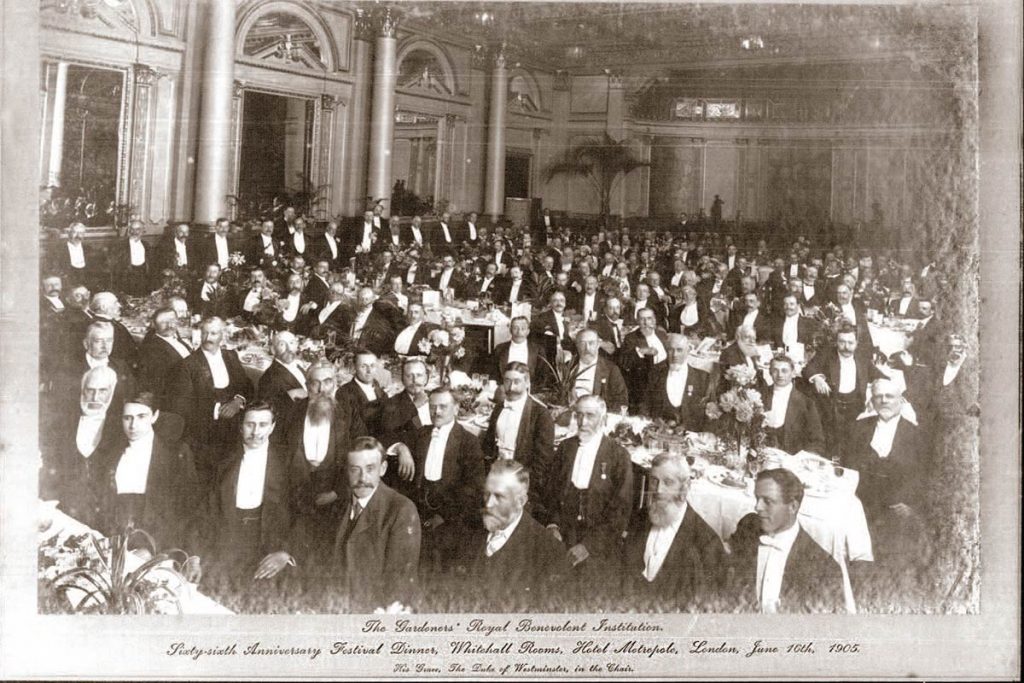
One of the The Gardeners’ Benevolent Institution's early annual dinners.
The Institution remained a pension-granting body for 100 years until state pensions were introduced in the early 20th century. At this time the focus of the charity shifted to running a care home and retirement housing, providing accommodation for aging gardeners. Financial assistance was now broadened to include emergency grants for those with disabilities and help to those working in other branches of horticulture, which were growing in importance.

Perennial's annual dinners 182 years on.
Perennial Now
Now the support Perennial extends to landscapers, gardeners, designers, grounds maintenance staff, green keepers, tree surgeons, groundsmen, British seed and turf growers, those involved in intensive production horticulture, parks and gardens staff and many, many more.
Now, at the grand old age of 182, Perennial is as needed as it ever was. The financial and social pressures on those working in, and retired from, horticulture are acute, particularly through the pandemic, as some horticulture professions are still relatively low paid and just as physically gruelling. Perennial is a ‘lifeline’ for many, providing free and confidential advice and financial assistance to the industry in the UK every year.
As our history shows and like the industry we serve, we are resilient and innovative. We survived through two world wars and rapidly responded to the current pandemic, speedily adapting to change when necessary. We plan to do so for many more years to come.
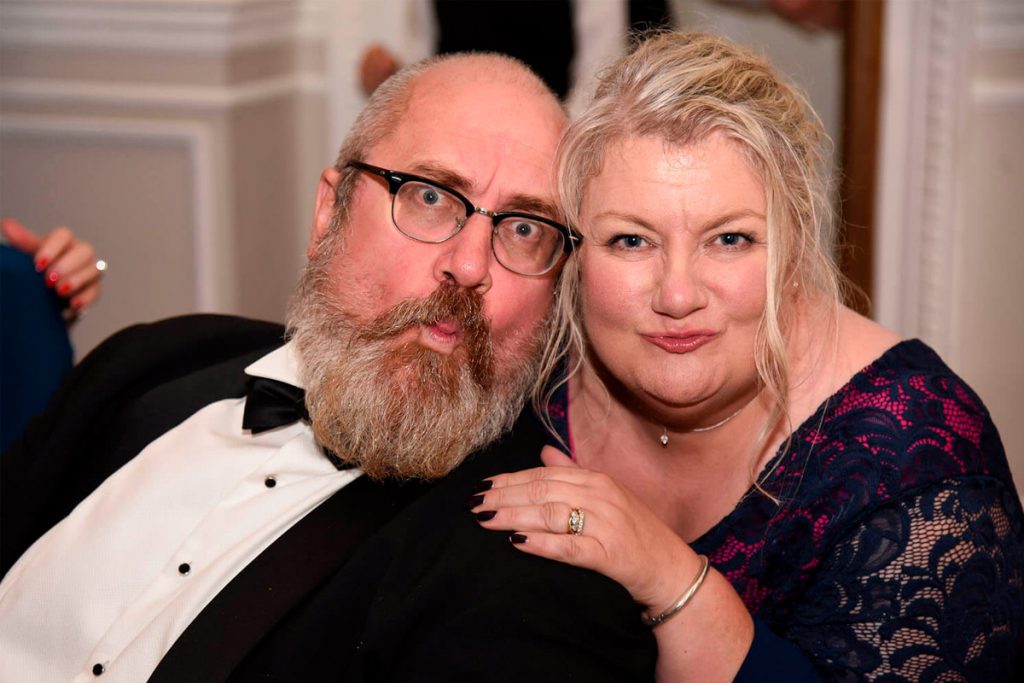
A good time to be had by all at the annual dinners.
If you would like to read more about Perennial’s history, the support we provide, or indeed ways that you can support us, please visit our website.


/filters:quality(60)/mediadev/media/menu-pics/all-porcelain.jpg )
/filters:quality(60)/mediadev/media/menu-pics/luxury-italian.jpg )
/filters:quality(60)/mediadev/media/menu-pics/premium-italian.jpg )
/filters:quality(60)/mediadev/media/menu-pics/budget-porcelain.jpg )
/filters:quality(60)/mediadev/media/menu-pics/large-format-porcelain.jpg )
/filters:quality(60)/mediadev/media/menu-pics/wood-effect-porcelain.jpg )
/filters:quality(60)/mediadev/media/menu-pics/porcelain-planks.jpg )
/filters:quality(60)/mediadev/media/menu-pics/porcelain-setts.jpg )
/filters:quality(60)/mediadev/media/menu-pics/browse-all-paving.jpg )
/filters:quality(60)/mediadev/media/menu-pics/stone-paving.jpg )
/filters:quality(60)/mediadev/media/menu-pics/interior-tiles.jpg )
/filters:quality(60)/mediadev/media/menu-pics/stone-effect-porcelain.png )
/filters:quality(60)/mediadev/media/menu-pics/wood-effect-porcelain.png )
/filters:quality(60)/mediadev/media/menu-pics/grey-porcelain.png )
/filters:quality(60)/mediadev/media/menu-pics/beige-porcelain.png )
/filters:quality(60)/mediadev/media/menu-pics/dark-porcelain.png )
/filters:quality(60)/mediadev/media/menu-pics/light-porcelain.png )
/filters:quality(60)/mediadev/media/menu-pics/patio-grout.jpg)
/filters:quality(60)/mediadev/media/menu-pics/primers.jpg)
/filters:quality(60)/mediadev/media/menu-pics/porcelain-blades.jpg)
/filters:quality(90)/mediadev/media/menu-pics/drainage.jpg)
/filters:quality(60)/mediadev/media/menu-pics/cleaners.jpg)
/filters:quality(60)/mediadev/media/menu-pics/all-stone-paving.jpg )
/filters:quality(60)/mediadev/media/menu-pics/all-sawn-paving.jpg )
/filters:quality(60)/mediadev/media/menu-pics/all-riven-paving.jpg )
/filters:quality(60)/mediadev/media/menu-pics/indian-sandstone.jpg )
/filters:quality(60)/mediadev/media/menu-pics/limestone-paving.jpg )
/filters:quality(60)/mediadev/media/menu-pics/granite-paving.jpg )
/filters:quality(60)/mediadev/media/menu-pics/slate-paving.jpg )
/filters:quality(60)/mediadev/media/menu-pics/yorkstone-paving.jpg )
/filters:quality(60)/mediadev/media/menu-pics/stone-pavers.jpg )
/filters:quality(60)/mediadev/media/menu-pics/cobbles-setts.jpg )
/filters:quality(60)/mediadev/media/menu-pics/plank-paving.jpg )
/filters:quality(60)/mediadev/media/menu-pics/paving-circles.jpg )
/filters:quality(60)/mediadev/media/menu-pics/bespoke-paving-1.jpg )
/filters:quality(60)/mediadev/media/menu-pics/edging-stones-1.jpg )
/filters:quality(60)/mediadev/media/menu-pics/prestige-stone.jpg )
/filters:quality(60)/mediadev/media/menu-pics/grey-blue-stone.png)
/filters:quality(60)/mediadev/media/menu-pics/swatch-black-dark.jpg )
/filters:quality(60)/mediadev/media/menu-pics/swatch-buff-beige-white.jpg )
/filters:quality(60)/mediadev/media/menu-pics/sealants.jpg)
/filters:quality(60)/mediadev/media/menu-pics/all-clay-paving.jpg )
/filters:quality(60)/mediadev/media/menu-pics/alpha-clay-pavers.jpg )
/filters:quality(60)/mediadev/media/menu-pics/cottage-garden-clay-pavers.jpg )
/filters:quality(60)/mediadev/media/menu-pics/kessel-garden-clay-pavers.jpg )
/filters:quality(60)/mediadev/media/menu-pics/artisan-clay-pavers.jpg )
/filters:quality(60)/mediadev/media/menu-pics/grey-blue-clay-paver.png )
/filters:quality(60)/mediadev/media/menu-pics/red-brown-clay-pavers.png )
/filters:quality(60)/mediadev/media/menu-pics/beige-buff-clay-pavers.png )
/filters:quality(60)/mediadev/media/menu-pics/composite-decking.jpg )
/filters:quality(60)/mediadev/media/menu-pics/designboard-decking.jpg )
/filters:quality(60)/mediadev/media/menu-pics/classic-designboard.jpg )
/filters:quality(60)/mediadev/media/menu-pics/brushed-designboard.jpg )
/filters:quality(60)/mediadev/media/menu-pics/grooved-designboard.jpg )
/filters:quality(60)/mediadev/media/menu-pics/millboard-decking.jpg )
/filters:quality(60)/mediadev/media/menu-pics/grey-decking.jpg )
/filters:quality(60)/mediadev/media/menu-pics/black-charcoal-decking.jpg)
/filters:quality(60)/mediadev/media/menu-pics/brown-decking.jpg)
/filters:quality(60)/mediadev/media/menu-pics/all-build-deck.png )
/filters:quality(60)/mediadev/media/menu-pics/stone-cladding.jpg )
/filters:quality(60)/mediadev/media/menu-pics/all-garden-walling-1.jpg )
/filters:quality(60)/mediadev/media/menu-pics/facing-bricks.jpg )
/filters:quality(60)/mediadev/media/menu-pics/garden-screening.jpg )
/filters:quality(60)/mediadev/media/menu-pics/all-steps-coping.jpg )
/filters:quality(60)/mediadev/media/menu-pics/stone-garden-steps.jpg )
/filters:quality(60)/mediadev/media/menu-pics/sawn-steps.jpg )
/filters:quality(60)/mediadev/media/menu-pics/riven-steps.jpg )
/filters:quality(60)/mediadev/media/menu-pics/yorkstone-steps.jpg )
/filters:quality(60)/mediadev/media/menu-pics/bespoke-steps.jpg )
/filters:quality(60)/mediadev/media/menu-pics/porcelain-steps.jpg )
/filters:quality(60)/mediadev/media/menu-pics/off-the-shelf.jpg )
/filters:quality(60)/mediadev/media/menu-pics/stone-coping.jpg )
/filters:quality(60)/mediadev/media/menu-pics/sawn-coping.jpg )
/filters:quality(60)/mediadev/media/menu-pics/riven-coping.jpg )
/filters:quality(60)/mediadev/media/menu-pics/yorkstone-coping.jpg )
/filters:quality(60)/mediadev/media/menu-pics/bespoke-coping.jpg )
/filters:quality(60)/mediadev/media/menu-pics/stone-pier-caps.jpg )
/filters:quality(60)/mediadev/media/menu-pics/porcelain-coping.jpg )
/filters:quality(60)/mediadev/media/menu-pics/all-bespoke-services.jpg )
/filters:quality(60)/mediadev/media/menu-pics/bespoke-paving-2.jpg )
/filters:quality(60)/mediadev/media/menu-pics/bespoke-steps-1.jpg )
/filters:quality(60)/mediadev/media/menu-pics/bespoke-coping-1.jpg )
/filters:quality(60)/mediadev/media/menu-pics/edge-profiles.jpg )
/filters:quality(60)/mediadev/media/menu-pics/masonry-services.jpg )
/filters:quality(60)/mediadev/media/menu-pics/deluxe-pergolas.jpg )
/filters:quality(60)/mediadev/media/menu-pics/proteus-pergolas.jpg )


